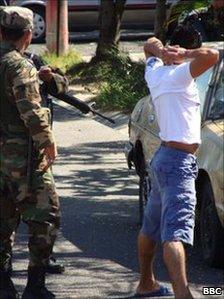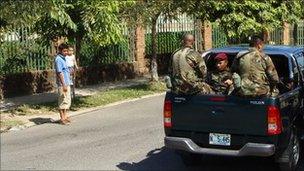El Salvador fears Mexico drug cartel violence overflow
- Published

El Salvador is watching to see if its own gangs form alliances with the Mexican cartels
From a giant billboard in the Salvadorean capital, a man with a defiant attitude shows off a slogan on his shirt: "No one can intimidate El Salvador," it reads.
The ad - part of a government-funded anti violence campaign - holds a special significance at the time when many worry that an overflow of Mexico's drug violence could soon hit this small Central American nation.
The first one to raise the alert was President Mauricio Funes himself, last April.
"We have information that they [the cartels] have entered El Salvador with exploratory purposes," President Funes said.
Because of what he described as the "effectiveness" of Mexican President Felipe Calderon's policies, the cartels were looking at new bases for their operations, he added.
Since then, security forces have been watching closely to see if criminal organisations like the Zetas - one of Mexico's most violent cartels - are deploying in Salvadorean territory.
The cartels' possible collusion - or confrontation - with local gangs is also being monitored.
Douglas Garcia Funes from the Salvadorean national police says intelligence suggests that gang members are already "being used by or are operatives for the transport of drugs and money towards the United States, passing through Mexico".
In a country with one of the highest murder rates in the world, this is a sobering scenario.
It could bring more chaos to an already violent country, many Salvadoreans say - and the government seems to be bracing for the worst.
"We are certainly worried, and that is why we want to act in a preventive manner," Hugo Martinez, El Salvador's foreign minister, told BBC News.
Tougher stance
The presence of the gangs known as "maras", born among Salvadorean migrants in Los Angeles in the 1980s, is believed to be the largest contributor to those soaring rates.
Some estimates say that about 15,000 young men and women belong to one of the gangs. In some families, a third generation of gang members is now developing.
The maras have strong territorial control in some areas of the country and practice what they call "social cleansing" - they wipe out petty crime, but ask for money from locals in exchange for protection, and engage in widespread criminal activity.
A retired gang member, who prefers not to be named, says that belonging to a "mara" gives young, poor Salvadoreans a sense of vindication against the larger society.
"People are scared, are afraid of what a gang member can do, like stealing or killing," he says.
"That is what being part of a 'mara' is about."
The maras are not new to El Salvador, but an incident in June marked a turning point.
Gang members set fire to a small bus in the capital, killing 17 people. The government branded it a "terrorist act".
Soon afterwards, the government proposed a tough "anti-mara" bill that makes it a criminal offence to belong to a gang or contribute to gang finances by paying extortion fees.
In addition, more than 6,000 soldiers - almost half of the army's manpower - have been deployed in hotspots around the country including border crossings, jails and areas with a strong "mara" presence.
This tougher stance was seen by many as preparation for the threat of Mexican cartels moving in to El Salvador.
Cruelty
The person who knows most about violence in El Salvador may well be Israel Ticas, a forensic investigator from the security ministry.

More than 6,000 soldiers have been deployed in hotspots around the country
He is the sole official in charge of the exhumation of bodies buried in clandestine graveyards by the gangs.
He has already unearthed more than 38 of these graves around the country - and he believes there are dozens more still to be found.
The walls of his office in the capital are covered with pictures of the bodies, many of them too hard to digest for a casual observer.
They show men and women tortured, beheaded, mutilated; the violence seems to reach unimaginable levels.
And, says Mr Ticas, the cruelty is only getting worse.
"In the last few years, the gangs have become more sophisticated" in the way they bury their victims, he says.
"They hide [the bodies] better and it is harder for us to find them - now they leave a beheaded body in one site and the head is buried five kilometres [three miles] away."
It is hard to imagine how violence in El Salvador could go any further - and that is why many fear that the arrival of foreign organised criminal groups would be a nightmare come true.
- Published9 September 2010
- Published15 August 2010
- Published21 June 2010